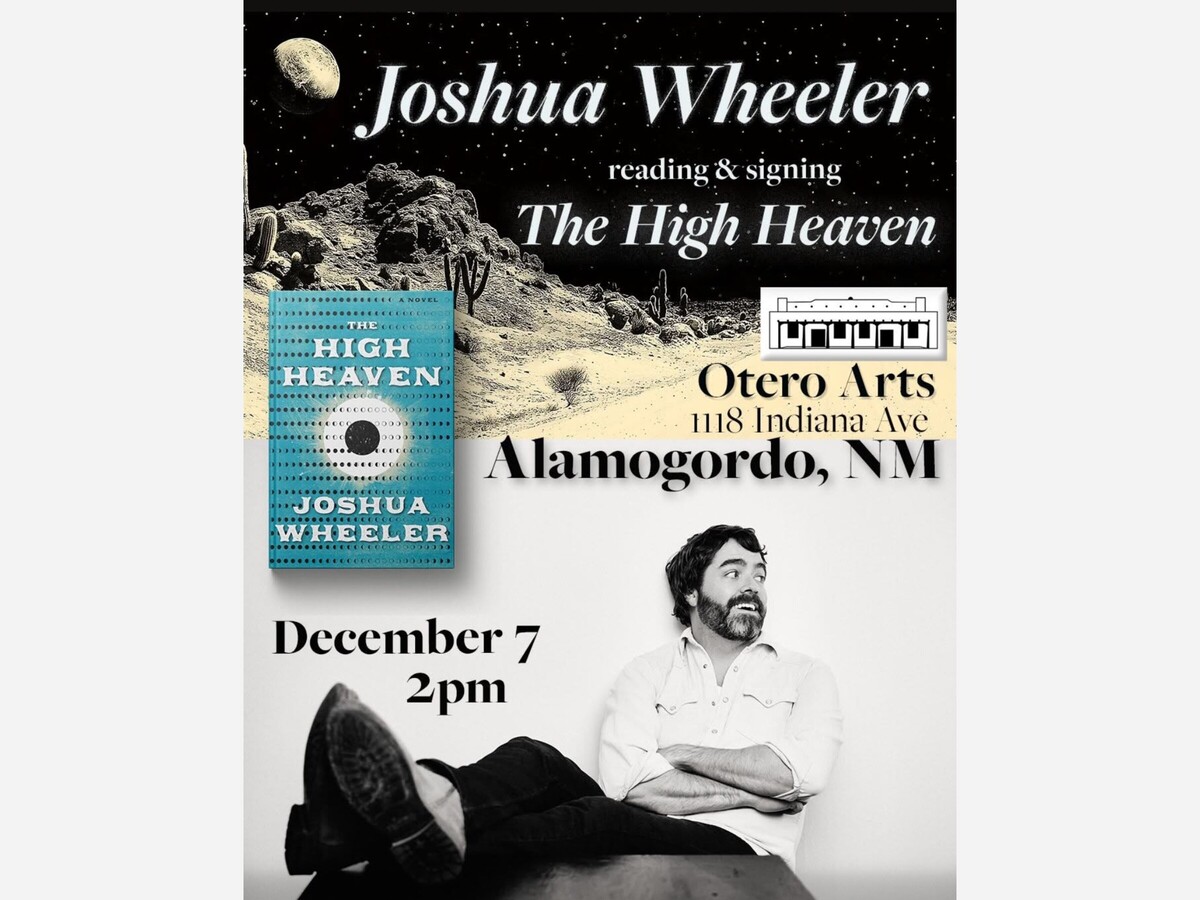Image


Otero Arts will host a homecoming of sorts when writer Joshua Wheeler, a native of Alamogordo, returns to share his latest work with the community. Wheeler, best known for his essay collection Acid West—a finalist for the Western Writers Spur Award and the New Mexico Book Award—has recently published his debut novel The High Heaven, which blends southern New Mexico’s space exploration legacy with themes of faith, survival, and identity.
The book signing and reading will take place on Sunday, December 7, 2025, at 2:00 PM at the Otero Artspace, 1118 Indiana in the Alamogordo MainStreet Culture Arts District. The event is part of the Otero Arts Quarterly Reading Series, which brings distinguished writers to Alamogordo to engage with local audiences.
Wheeler’s work has been praised by national outlets such as the Los Angeles Review of Books and the LA Times, which described his writing as “fluorescent…brilliant…worth reading more than once” and “a brilliant portrait of a place and a people…written with enviable verve and erudition."
The upcoming event offers Alamogordo residents a chance to meet Wheeler, hear him read excerpts from The High Heaven, and reflect on how his writing continues to draw inspiration from the landscapes and histories of southern New Mexico.
The High Heaven Review by Local Author and Journalist Chris Edwards
Joshua Wheeler’s return to Otero Arts is more than a literary event—it is a reclamation of memory and place. As someone who has chronicled the civic and cultural life of Otero County, I see Wheeler’s work as a mirror held up to our desert, refracting its contradictions and its beauty.
In Acid West, Wheeler excavated the surreal legacies of atomic testing, UFO lore, and cowboy masculinity. With The High Heaven, he turns to fiction, but the themes remain deeply rooted in our soil. The novel’s protagonist, Izzy, orphaned in the chaos of a southern New Mexico cult, becomes a vessel for exploring how faith and technology collide in the desert. Wheeler’s prose is at once lyrical and unflinching, weaving together the absurdist history of American space travel with the intimate struggles of survival.
What makes Wheeler’s voice vital is his ability to honor the eccentricities of our Alamogordo region while situating them in the broader currents of American identity. He writes not as an outsider but as a seventh-generation New Mexican whose family history is entangled with White Sands and the shifting fortunes of ranch life in the Tularosa Basin. His stories remind us that Alamogordo is not a footnote in history but a crucible where innovation, belief, and resilience converge with life continuing with twists and turns.
Joshua Wheeler’s prose differs from many New Mexico voices in that it refuses to settle into either lyricism or folklore alone—it is investigative, hybrid, and restless. Where Rudolfo Anaya grounds his stories in mythic heritage and Denise Chávez in community theater and borderlands identity, Wheeler pushes into the surreal contradictions of the desert: missile ranges beside ranches, UFO cults beside Catholic shrines. His sentences often carry a fluorescent charge, layering reportage with cosmic speculation, so that the reader feels both the grit of southern New Mexico culture and the vertigo of its mysteries.
By contrast, poets like Carrie Fountain lean into intimacy and spiritual lyricism, tracing adolescence and faith through carefully measured lines. Wheeler, however, writes like a journalist who has inhaled the desert’s hallucinatory air—his essays and fiction are less about belonging and more about disorientation, about how technology, myth, and landscape collide. In that way, he embodies the Tularosa Basin desert’s paradox: rooted in place yet always scanning the skies, skeptical yet reverent, a voice that insists Alamogordo New Mexico is not just backdrop but crucible for cosmic inquiry.
The upcoming signing at Otero Arts is an invitation to celebrate that paradox. Wheeler’s presence here affirms that our community continues to inspire narratives and talent that resonate far beyond our county lines. For local readers, it is a chance to encounter a writer who transforms the peculiarities of our desert into universal meditations on belonging and transcendence.